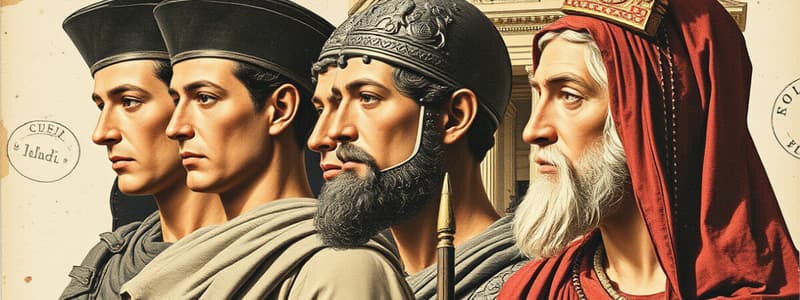Podcast
Questions and Answers
What were plebeians in the context of ancient Rome?
What were plebeians in the context of ancient Rome?
The working class, Roman citizens.
What were tribunes responsible for in ancient Rome?
What were tribunes responsible for in ancient Rome?
Representing the interests of the plebeians.
Who were the main opposing forces in the Punic Wars?
Who were the main opposing forces in the Punic Wars?
Carthage and Rome.
What is a dictator in the context of the Roman Republic?
What is a dictator in the context of the Roman Republic?
What is a Republican government?
What is a Republican government?
Who were the patricians?
Who were the patricians?
What did the Edict of Milan accomplish?
What did the Edict of Milan accomplish?
What impact did the Germanic 'barbarians' have on the Roman Empire?
What impact did the Germanic 'barbarians' have on the Roman Empire?
Flashcards are hidden until you start studying
Study Notes
PLEBIANS
- Working class citizens in ancient Rome.
- Gained rights to elect tribunes to represent their interests in government during the 5th Century BCE.
- The Twelve Tables (449 BCE) marked the first codification of Roman laws, a significant concession from patricians.
- Eventually, plebeians became eligible for almost all state offices, influencing Rome's political landscape.
TRIBUNES
- Elected officials representing the plebeians' interests.
- Held power to intervene in political decisions and veto unfair measures during the 5th Century BCE.
- Played a crucial role in the development of Roman law and the assembly's power dynamics.
PUNIC WARS
- Series of three conflicts between Rome and Carthage from 264 to 164 BCE.
- Driven by competition over control of Sicily, vital for grain supply in the western Mediterranean.
- Culminated in Carthage's defeat, establishing Rome as the dominant power in the region.
DICTATOR
- Temporary leader appointed by the Roman Senate for six months during crises in the Roman Republic from 509 to 27 BCE.
- Frequently appointed during the Conflict of the Orders, when plebeians sought equality with patricians.
- Enabled stable governance during tumultuous periods; notable for Julius Caesar’s self-appointment as "dictator for life," which caused Senate discontent.
REPUBLICAN GOVERNMENT
- Ancient Rome's democratic system where power rested with the populace through elected representatives from 509 to 27 BCE.
- Distinct from direct democracy, as citizens voted for representatives who made decisions on their behalf.
- Represented the first widespread implementation of this governance model in the Western world.
PATRICIANS
- Elite ruling class in ancient Rome, typically wealthy and defined by birthright from 509 to 27 BCE.
- Dominated the Senate and Roman politics, particularly during the early Republican era (500-370 BCE).
- Central figures during the Conflict of the Orders, which addressed plebeian demands for equality.
EDICT OF MILAN
- Proclamation enacted in 313 C.E. by Constantine and Licinius allowing Christianity to be practiced openly within the Roman Empire.
- Fully legalized Christianity for the first time, facilitating its spread throughout the empire.
GERMANIC "BARBARIANS"
- Groups including the Huns, Visigoths, Ostrogoths, Vandals, and Franks pressed into the Roman Empire seeking refuge.
- Settlements established in Italy, Gaul, Spain, Britain, and North Africa, significantly impacting the empire's demographics.
- Visigoths specifically adapted Roman culture and laws, contributed soldiers to Roman armies, and played a notable role in the empire's transformation.
Studying That Suits You
Use AI to generate personalized quizzes and flashcards to suit your learning preferences.



